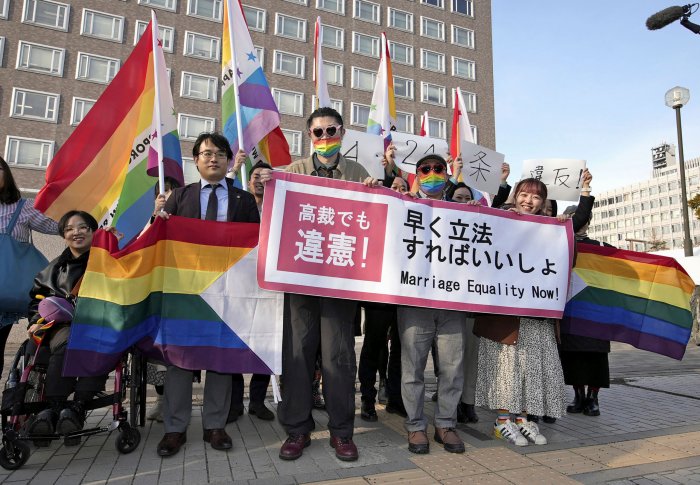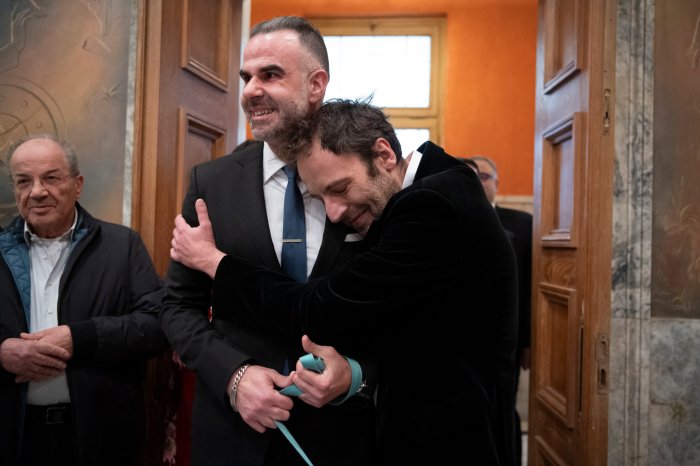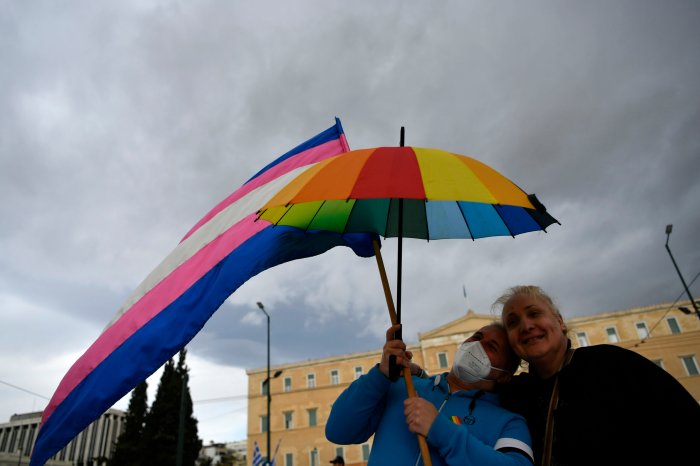(Berlin) A prominent gay member of Germany’s parliament, Volker Beck, and the Lesbian and Gay Federation in Germany (LSVD) have launched an escalating assault on the policies of the country’s first openly gay foreign minister, Guido Westerwelle, accusing him of ignoring the persecution of the LGBT community in the Muslim world. Last week, in the wake of Westerwelle’s visit to Saudi Arabia, Beck and the LSVD, in exclusive interviews with Gay City News, voiced sharp criticisms of his silence.
Renate Heike Rampf, an LSVD spokeswoman, issued a scathing report card on Westerwelle’s nascent track record as foreign minister, telling Gay City News that he “is not a front man for the rights of lesbians, gays, and transgendered people.”
Beck, the Green Party’s human rights spokesman in the Bundestag, Germany’s parliament, told the newspaper that Westerwelle “could have been clearer and more concrete” regarding the repression of gays in Saudi Arabia. Westerwelle spoke only in “abstract” terms about hangings in Saudi Arabia, said Beck, adding, “One loses the debate when it is cultural. It is a legal debate. Human rights are universal. Mr. Westerwelle is not knowledgeable” about human rights violations.
Is Guido Westerwelle taking a dive on challenging lethal homophobia in the Islamic world?
Beck’s criticism carries enormous currency because of his international standing. In 2005, the US Equality Form, a Philadelphia-based organization devoted to combating homophobia worldwide, honored Beck, the only European award winner that year, as a “hero” for his dogged fight for LGBT civil rights, including marriage equality.
While visiting Saudi Arabia during the second week of January, Westerwelle remained publicly silent about the numerous executions of gay men documented in the fundamentalist Islamic country. Instead, speaking in the Saudi capital of Riyadh, he emphasized the broader view that “the death penalty should be abolished around the world.” The Saudi foreign minister, Prince Saud Al-Faisal, replied that there are “differences in values and culture.”
A year before Westerwelle took the reins at the foreign ministry, he had argued for an assertive human rights policy, saying that Germany should pull the plug on economic development aid in countries “where men and women are hanged only because they are homosexuals.”
In an email to Gay City News, a spokesman for the German Foreign Ministry responded to Beck’s criticism, writing, “The foreign minister is forcefully involved in the compliance of all human rights. The topic was logically a part of his talks in Saudi Arabia.” The spokesman added that Westerwelle “left no doubt” in the minds of his Saudi counterparts about the German government’s views.
Westerwelle’s pro-business Free Democrats (FDP) won 14.6 percent of the German vote in last September’s national election, enabling the liberal party to form a coalition with Chancellor Angela Merkel’s centrist Christian Democratic Union. As chairman of the FDP, the 48-year-old Westerwelle navigated the Free Democrats to their best electoral results ever and was rewarded with the Foreign Ministry post.
Under the chairmanship of an openly gay Bundestag member, however, the FDP has not pushed for marriage equality, according to the LSVD; instead it supports civil unions. Same-sex marriage has support from only two parliamentary parties, the Greens and the Left. Westerwelle’s party, however, does advocate adoption rights for gays and lesbians and equality in the tax treatment of same-sex couples.
Westerwelle came out in 2004, when he brought his partner, Michael Mronz, to Merkel’s 50th birthday party. Mronz, 42 and dubbed by the tabloid press as one of the 50 handsomest men in Germany, is an event manager who organized the International Association of Athletics Federations’ championship games in Berlin last summer. A member of the FDP, he served as one of Westerwelle’s closest political advisers during the 2009 election campaign.
Significantly, while Mronz traveled with Westerwelle on trips to China and Japan, he did not accompany him on his recent whirlwind tour of such notoriously anti-gay countries as Saudi Arabia, Yemen, the United Arab Emirates, and Qatar.
Rampf, the LSVD spokeswoman, told Gay City News, “Westerwelle visited four countries where homosexuality is illegal and many others in which gays and lesbians do not have an easy time. On none of his trips did he make any public statements. But there are photos of him with politicians who allow homosexuals to be persecuted, though they will never again be able to say that they wouldn’t shake a gay person’s hand.”
LSVD originally had high expectations for Westerwelle. After his appointment as foreign minister, Klaus Jetz, the organization’s leader, said, “We think it’s awesome that it has become so normal that an openly gay man becomes foreign minister.” The LSVD expected Westerwelle to advance the rights of the LGBT community abroad.
Rampf told Gay City News, “If the foreign minister had addressed the issue publicly, he might have caused a scandal, and Westerwelle would have been identified as homosexual even more than he is now. He avoided this, and thus stayed true to his policy of keeping silent on the issue in his political life. And he continued the tradition of other foreign ministers — keeping quiet about homosexuality.”
The Foreign Ministry declined to provide specifics about Westerwelle’s commitment to combating homophobia in countries ranging from the Arab world to Iran and Russia. A spokesman told Gay City News, “The federal government places itself in association with its partners in the European Union to actively fight against homosexual discrimination.” The spokesman added that the German government is “following with great concern the growing and increasingly difficult developments in Iran and is therefore directly engaged for the human rights violations of affected persons.”
Traditionally, the FDP has taken a meek posture toward the Iranian regime. Advancing Germany’s economic position as the world’s leading export nation (a slot that China just this month snatched) has been the point of departure for previous FDP foreign ministers, leading them to placate authoritarian Islamic governments in the Mideast. The party has vehemently opposed robust sanctions against Iran aimed at curbing its violations of the world’s nuclear non-proliferation treaty. Critics of the FDP’s foreign policy have charged it amounts to pure appeasement in its failure to challenge the Iranian regime’s goal of going nuclear while repressing pro-democracy aspirations and civil rights, including those of the LGBT community.
As early as 1984, then-Foreign Minister Hans-Dietrich Genscher, a key adviser and mentor to Westerwelle, became the first major European diplomat to seek stronger political and economic ties to Iran’s Islamic regime. Genscher argued that a “critical dialogue” approach would serve as a dose of behavioral therapy to convince the Iranians to be more moderate. The Genscher strategy proved successful in narrow economic terms, but was a disaster for the LGBT community. Germany is Iran’s most important trade partner within the European Union, with annual exports to Tehran hovering around $5.7 billion.
Meanwhile, reports of a lethal crackdown on homosexuality in Iran continue to surface. In late December, Doug Ireland, writing in Gay City News, reported that “ten young Iranian men, including eight teenagers, are currently awaiting execution for sodomy, and two more are being re-tried on the same capital charge.” World attention to the deadly persecution of gays in Iran ramped up considerably in 2005, when two adolescents were hanged on the basis of sodomy charges. According to Amnesty International (AI), the Islamic Republic leads the world in executing juveniles.
Monika Lüke, AI’s top official in Germany, had appealed to Westerwelle before his visit to Saudi Arabia to bring attention to the execution of gays there. “Each person has the responsibility” to address human rights violations “when homosexuals are adversely discriminated against in such a massive manner,” she said, stressing that it is not a “special responsibility for a foreign minister who is himself homosexual. If the chancellor would travel to Saudi Arabia, we would demand the same responsibility.”
LSVD’s Rampf emphasized the pivotal position Germany enjoys in influencing the Iranian regime’s behavior. “Iran is not indifferent to what Germany says,” she argued. “It can save lives. The federal government must make it clear to the regime that the death penalty must be abolished. A ‘No Execution Campaign’ will be started by the LSVD in the coming days with IRQR, an Iranian exile organization.”
Business interests however, push the German government in a different direction. The country’s lax export regulations permitted German engineering giant Siemens — through its subsidiary Siemens-Nokia — to deliver sophisticated surveillance equipment to the Iranian regime used to monitor and stifle Internet and mobile and landline telephone communications, valuable communications weapons for Iran’s LGBT activists. That helps explain why Ireland’s December telephone interview with 21-year old queer activist Hesam Misaghi was abruptly severed.
Siemens’ recent conduct has unfortunate precedents in its corporate history. The company was instrumental in advancing Hitler’s war machinery by exploiting Auschwitz slave labor. The political organization Stop the Bomb in Germany and Austria has lead the effort to show the unsavory role of such blue-chip German firms as Siemens, ThyssenKrupp AG, Mercedes Benz, Linde, and MAN in fostering business deals with Iranian President Mahmoud Ahmadinejad’s regime at the expense of the rights of that nation’s LGBT community.
Rampf said, “The path of cooperation must be taken. Develop programs that respect women’s rights and the rights of homosexuals. This is also a challenge to the business world.”

































